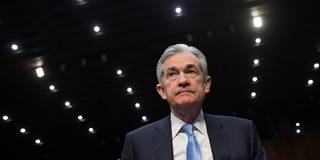President Donald Trump does not adhere to some standard conservative positions, like favoring free trade. But he knows very well what he wants with regard to the relationship between government and business, and what he wants threatens not only financial stability, but also the legitimacy of the US Federal Reserve.
WASHINGTON, DC – There has been a great deal of concern recently about potential action by the US Congress to roll back the 2010 Dodd-Frank financial reforms, enacted in the wake of the 2008 crisis. In the end, while the Republican-controlled House of Representatives wanted a broad repeal, the Senate could be persuaded only to support relatively minor relaxation of the rules for small and medium-size banks. Unfortunately, given the politics of finance in the Trump era, this does not mean that the financial system will remain relatively safe.
President Donald Trump has a broad deregulation agenda, supported by House and Senate Republicans. Most of the key powers to regulate finance have already been delegated to the Federal Reserve – ironically by the Dodd-Frank legislation itself. And the president appoints the people who have complete control over regulation at the Fed. This is a dangerous combination.
Trump does not adhere to some standard conservative positions, like favoring free trade. But he knows very well what he wants with regard to the relationship between government and business: he wants the government to stop telling business what to do. On this issue, the president stands in a direct line of ideological descent from Ronald Reagan, who strongly believed that government was the problem.

WASHINGTON, DC – There has been a great deal of concern recently about potential action by the US Congress to roll back the 2010 Dodd-Frank financial reforms, enacted in the wake of the 2008 crisis. In the end, while the Republican-controlled House of Representatives wanted a broad repeal, the Senate could be persuaded only to support relatively minor relaxation of the rules for small and medium-size banks. Unfortunately, given the politics of finance in the Trump era, this does not mean that the financial system will remain relatively safe.
President Donald Trump has a broad deregulation agenda, supported by House and Senate Republicans. Most of the key powers to regulate finance have already been delegated to the Federal Reserve – ironically by the Dodd-Frank legislation itself. And the president appoints the people who have complete control over regulation at the Fed. This is a dangerous combination.
Trump does not adhere to some standard conservative positions, like favoring free trade. But he knows very well what he wants with regard to the relationship between government and business: he wants the government to stop telling business what to do. On this issue, the president stands in a direct line of ideological descent from Ronald Reagan, who strongly believed that government was the problem.